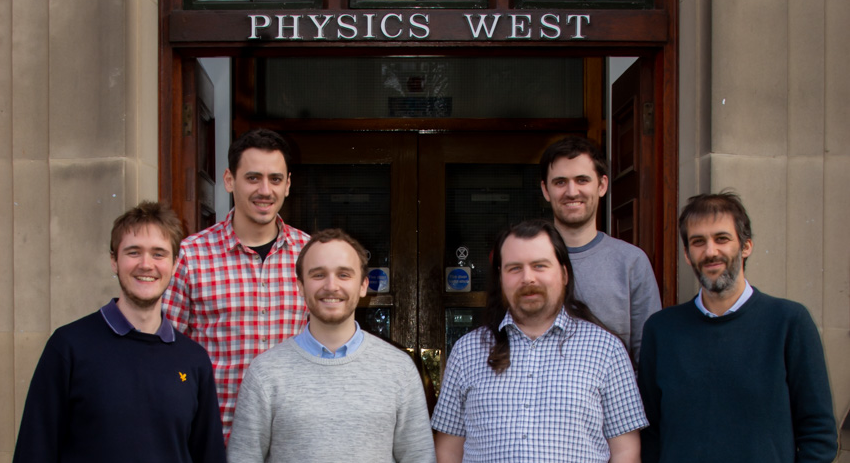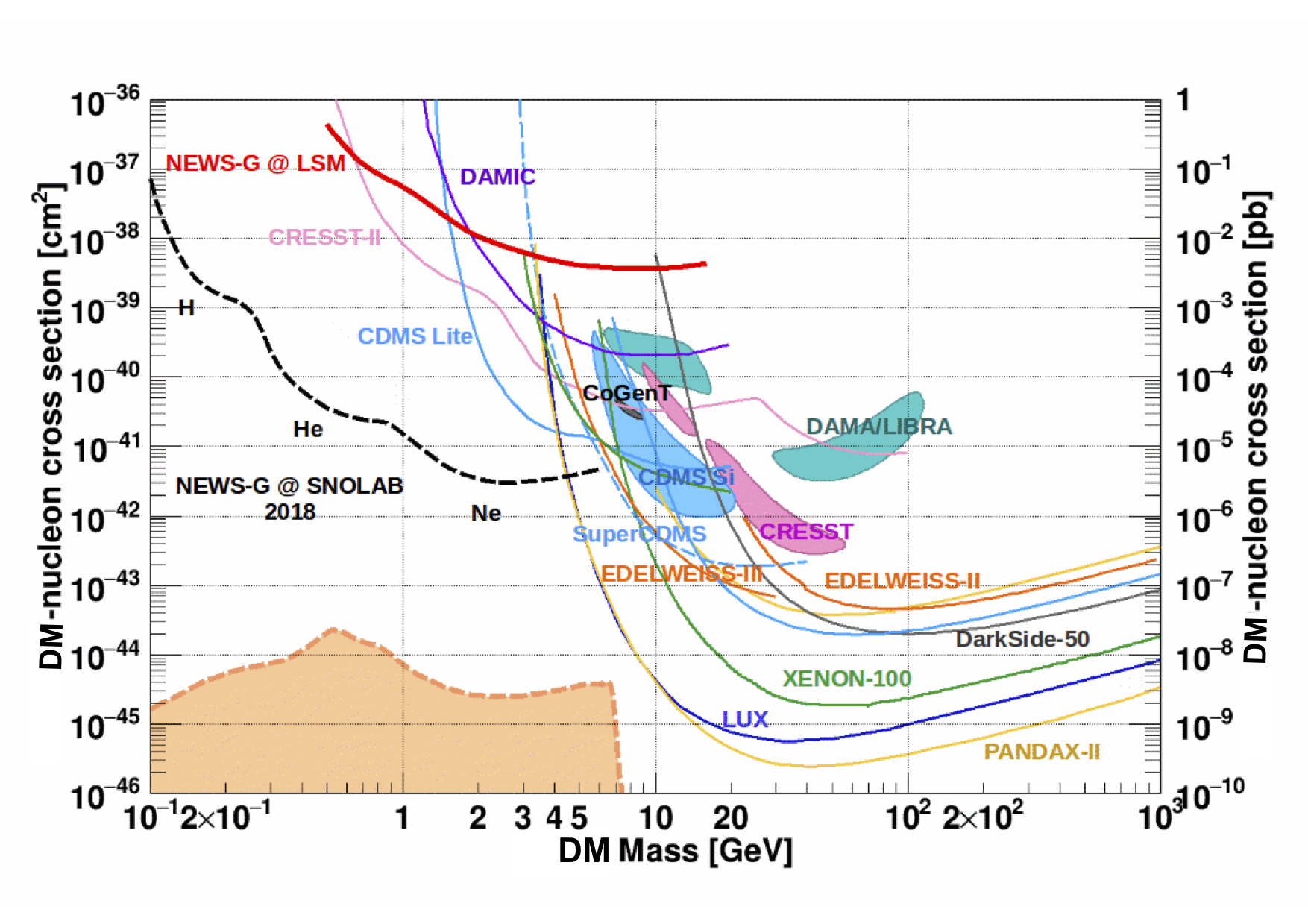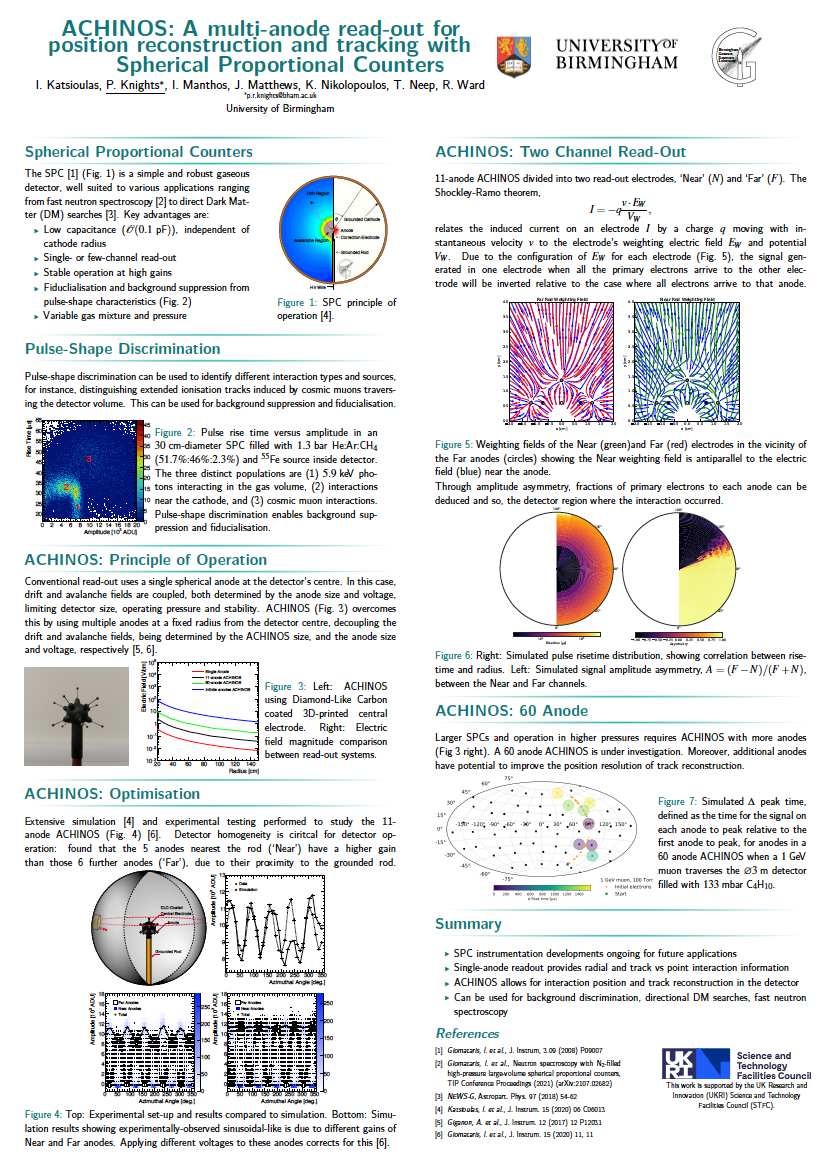
Dark Matter searches at Birmingham
Ioannis Katsioulas, Patrick Knights, Ioannis Manthos, Jack Matthews, Lex Millins, Tom Neep, Kostas Nikolopoulos, Giovanni Rogers, Robert Ward |
Recent leavers: Ioannis Katsioulas, Rhys Owen
|
|
The New Experiments With Spheres-Gas (NEWS-G) network are a number
of experiments working with the novel technology of a spherical proportional
counter (SPC). The benefits of such a technology are;
- Cheap and simple technology low threshold
- single or few channel read-out
- flexible gas, gain and pressure
- good energy resolution
- efficient fiducial cuts
|

|

|
For the ideal case of a small spherical sensor located at the centre
of a spherical shell, the electric field goes as 1/r2 and the
capacitance is proportional to the size of the inner sensor so is of
order 1 pF. Charges produced in the volume will drift until ~1 mm
from the sensor, where an avalanche occurs. This high amplification
close the ball minimises the diffusion of the secondary charges and
reduces the rise-time of a pulse. This allows single electron
detection. The rise-time of pulses may be used to select the fiducial
region of the detector.
|
The applications of such a versatile detector are many, including
gamma ray and neutron spectroscopy, coherent nuclear neutrino
scattering, double beta-decay searches and Dark Matter (DM)
detection. SeDiNe (Spherical Detector of Neutrons) is one such sphere,
60 cm in diameter and made from low activity copper and installed at
the Laboratoire Souterrain de Modane (LSM). Initially implemented to
investigate the low thermal and fast neutron fluxes in the lab, SeDiNe
has also been used to look for low mass dark matter particle
candidates, and published NEWS-G's first result setting a word-leading limit
for a 0.5 GeV/c2 DM candidate, at that time.
In 2021 a 1.4 m diameter copper sphere "SNOGLOBE"
installed in SNOLAB in Canada and currently taking data.
As the second deepest and the cleanest underground laboratory in the world,
SNOLAB offers a shelter from cosmic rays and secondary particles.
The main physics aims to search for:
- Dark matter candidates with a mass in the range 0.1
GeV/c2 to 5 GeV/c2 through spin independent couplings
- Kaluza Klein
axions through two photon decay channel
- Dark matter candidates with spin
dependent couplings through the selection of gases containing hydrogen
The Particle Physics group at the University of Birmingham offers major
contribution to NEWS-G, holding critical positions of responsibility, and to
SPC development. More specifically, it is leading the SPC instrumentation R&D,
advancing the multi-anode "ACHINOS" sensor that permit the high gain - high
pressure operation of the detector, and developing a comprehensive simulation
framework that fully describes the response of the SPC. Moreover, the group
has a leading role in research and development for the next stages of NEWS-G,
including novel pure copper electroforming techniques and background
mitigation, and physics potential studies. Additionally, the group is
spearheading wider application of the detector for neutron spectroscopy.
As well as having far reaching applicability beyond fundamental Physics,
e.g. in medical environments, this technique can provide an invaluable tool
for characterising the crucial neutron background at underground DM experiments.
The Particle Physics group has installed a 30 cm SPC at the Boulby underground
Laboratory, in North Yorkshire (UK) for R&D purposes in the low cosmic muon
background environment. Also, the group is capitalising the expertise
developed by collaborating with Pacific Northwest National Laboratory (PNLL)
on electroformed copper (EFCu), by currently commissioning such a facility in
Boulby, that will permit the production of radiopure materials for detectors.
|
The NEWS-G activities of the Particle Physics group have received funding from
the European Union’s Horizon 2020 research and innovation programme
under grant agreements no 841261 (DarkSphere), no 845168 (neutronSphere) and No
101026519 (GaGARin).
|

|

|
Collaborations with colleagues in CEA-Saclay (France) are supported by the Internation Exchanges scheme of The Royal Society.
|
Publications
- Neutron spectroscopy: The case of the spherical proportional counterI. Giomataris, I. Katsioulas, P. Knights, I. Manthos, T. Neep, K. Nikolopoulos, T. Papaevangelou, R. Ward, NIM-A 1045 (2023) 167590.
- ACHINOS: a multi-anode read-out for position reconstruction and tracking with spherical proportional countersI. Katsioulas, P. Knights, I. Manthos, J. Matthews, T. Neep, K. Nikolopoulos, R. Ward, JINST 17 (2022) 08 C08025.
- Neutron spectroscopy with a high-pressure nitrogen-filled spherical proportional counterI. Giomataris, S. Green, I. Katsioulas, P. Knights, I. Manthos, T. Neep, K. Nikolopoulos, T. Papaevangelou, B. Phoenix, J. Sanders, R. Ward, submitted to NIM-A.
- Ionisation quenching factors from W-values in pure gases for rare event searchesI. Katsioulas, P. Knights, K. Nikolopoulos, Astroparticle Physics 141 (2022) 102707.
- The NEWS-G detector at SNOLABThe NEWS-G collaboration, submitted to JINST.
- Measurements of the ionization efficiency of protons in methaneThe NEWS-G collaboration, submitted to Eur. Phys. J. C.
- Quenching factor measurements of neon nuclei in neon gasThe NEWS-G collaboration, Phys.Rev.D 105 (2022) 052004.
- Solar Kaluza-Klein axion search with NEWS-GThe NEWS-G collaboration, Phys. Rev. D 105 (2022) 012002.
- Fast neutron spectroscopy with a high-pressure nitrogen-filled large volume spherical proportional counter I. Giomataris, I. Katsioulas, P. Knights, I. Manthos, J. Matthews, T. Neep, K. Nikolopoulos, T.Papaevangelou, B.Phoenix, R.Ward, 2021 IEEE Nuclear Science Symposium and Medical Imaging Conference (NSS/MIC) 2021 pp. 1-3.
- Purification efficiency and Rn emanation of gas purifiers used with pure and binary gas mixtures for gaseous Dark Matter detectorsK. Altenmüller et al., 2021 IEEE Nuclear Science Symposium and Medical Imaging Conference (NSS/MIC) 2021 pp. 1-3.
- Status of the R2D2 project: A future neutrinoless double beta decay experiment I. Katsioulas on behalf of the R2D2 collaboration, . Phys.: Conf. Ser. 2105 (2021) 012016.
- Neutron Spectroscopy with N2-filled high-pressure large-volume spherical proportional countersI. Giomataris, S. Green, I. Katsioulas, P. Knights, I. Manthos, J. Matthews, T. Neep, K. Nikolopoulos, T. Papaevangelou, B. Phoenix, J. Sanders, R. Ward, accepted for publication to Journal of Physics: Conference series.
- NEWS-G: Search for Light Dark Matter with a Spherical Proportional Counter, P. Knights, K. Nikolopoulos, M.C. Piro on behalf of the NEWS-G collaboration, PoS(ICHEP2020) 390 (2021) 639.
- R2D2 spherical TPC: first energy resolution results, R. Bouet et al, JINST 16 (2021) P03012.
- Search for light dark matter with NEWS-G, K. Nikolopoulos, JINST 15 (2020) C06034.
- Development of a Simulation Framework for Spherical Proportional Counters, I. Katsioulas et al., JINST 15 (2020) C06013.
- A resistive ACHINOS multi-anode structure with DLC coating for spherical proportional counters, I. Giomataris et al., submitted to JINST (arXiv:2003.01068).
- Fast Neutron Spectroscopy with a Nitrogen-Based Gaseous Detector, I. Katsioulas et al., 2019 IEEE Nuclear Science Symposium (NSS) and Medical Imaging Conference (MIC) (2019).
- Recent Developments in the Read-Out Electrodes for the Spherical Proportional Counter, P. Knights et al., 2019 IEEE Nuclear Science Symposium (NSS) and Medical Imaging Conference (MIC) (2019).
- Development of a Simulation Framework for Spherical Proportional Counters, R. Ward et al, 2019 IEEE Nuclear Science Symposium and Medical Imaging Conference, Manchester, UK, 29 October, 2019
- NEWS-G: Light dark matter search with a Spherical Proportional Counter, K. Nikolopoulos, PoS CORFU2018 (2019) 088.
- Precision laser-based measurements of the single electron response of spherical proportional counters for the NEWS-G light dark matter search experiment, NEWS-G Collaboration, Phys. Rev. D 99 (2019) 102003.
- A sparkless resistive glass correction electrode for the spherical proportional counter, I. Katsioulas et al., JINST 13 (2018) P11006.
- Gas and copper purity investigations for NEWS-G, P. Knights for the NEWS-G Collaboration, J.Phys.Conf.Ser. 1312 (2019) 012009
- Precision laser-based measurements of the single electron response of SPCs for the NEWS-G light dark matter search experiment, NEWS-G Collaboration, Submitted to: Phys.Rev.D
- A sparkless resistive glass correction electrode for the spherical proportional counter, I. Katsioulas, I. Giomataris, P. Knights, M. Gros, X.F. Navick, K. Nikolopoulos, I. Savvidis, JINST 13 (2018) P11006
- ESS nBLM: Beam Loss Monitors based on Fast Neutron Detection, T. Papaevangelou et al., Proceedings, 61st ICFA Advanced Beam Dynamics Workshop on High-Intensity and High-Brightness Hadron Beams (HB2018): Daejeon, Korea, June 17-22, 2018
- Spherical Proportional Counter: A review of recent developments, Q. Arnaud, A. Brossard, A. Dastgheibi-Fard, G. Gerbier, I. Giomataris, I. Katsioulas, P. Knights, K. Nikolopoulos, I. Savvidis on behalf of the NEWS-G collaboration, J.Phys.Conf.Ser. 1029 (2018) 012006.
Conference/Workshop contributions
- P. Knights, Status and Future Prospects of the NEWS-G Experiment, 14th International Conference on Identification of Dark Matter, Vienna, Austria, 18-22 July 2022.
- I. Manthos, Towards efficient neutron spectroscopy with a Nitrogen-filled Spherical Proportional Counter, 41st International Conference on High Energy Physics (ICHEP 2022), Bologna, Italy, July 2022.
- R. Ward, The R2D2 neutrinoless double-beta decay experiment, 41st International Conference on High Energy Physics (ICHEP 2022), Bologna, Italy, July 2022.
- K. Nikolopoulos, NEWS-G searches for light dark matter: Results with a hydrogen-rich target, 41st International Conference on High Energy Physics (ICHEP 2022), Bologna, Italy, July 2022.
- P. Knights, NEWS-G: Search of Light Dark Matter with a Spherical Proportional Counter, HEP-2022, Conference on Recent Developments in High Energy Physics and Cosmology, Thessaloniki, Greece, June 2022.
- K. Nikolopoulos, Direct Dark Matter searches, HEP-2022, Conference on Recent Developments in High Energy Physics and Cosmology, Thessaloniki, Greece, June 2022.
- I. Manthos, Neutron Spectroscopy: The case of the Spherical Proportional Counter, 15th Pisa meeting on advanced detectors, Elba, Italy, May 2022.
- I. Katsioulas, Reaching the neutrino floor for sub-GeV dark matter with spherical proportional counters fully electroformed underground, Joint APP and HEPP Annual Conference, RAL-STFC, Oxford, UK, Apr 2022.
- P. Knights, Status of the R2D2 0νββ Experiment, Joint APP and HEPP Annual Conference, RAL-STFC, Oxford, UK, Apr 2022.
- I. Manthos, Towards efficient neutron spectroscopy with a Nitrogen-filled Spherical Proportional Counter, Joint APP and HEPP Annual Conference, RAL-STFC, Oxford, UK, Apr 2022.
- P. Knights, NEWS-G, Lake Louise Winter Institute, Lake Louise, Canada, 20–26 Feb 2022.
- K. Nikolopoulos, Latest news from the NewsG experiment, 10th Symposium on Large TPCs for low-energy rare event detection, Paris, France, 15–17 Dec 2021.
- P. Knights, Purification efficiency and Rn emanation of gas purifiers used with pure and binary gas mixtures for gaseous Dark Matter detectors, 2021 IEEE Nuclear Science Symposium and Medical Imaging Conference, (Virtual) Japan, Oct 2021.
- I. Manthos, Fast neutron spectroscopy with a high-pressure nitrogen-filled large volume spherical proportional counter, 2021 IEEE Nuclear Science Symposium and Medical Imaging Conference, (Virtual) Japan, Oct 2021.
- P. Knights, ACHINOS: A multi-anode read-out for position reconstruction and tracking with spherical proportional counters, 12th International Conference on Position Sensitive Detectors - PSD12, Birmingham, UK, 12-17 September 2021.
- T. Neep, NEWS-G: Search for Light Dark Matter with Spherical Proportional Counters, PANIC 2021, Online, Lisbon, Portugal, 5-10 September 2021.
- K. Nikolopoulos, Reaching the neutrino floor for sub-GeV dark matter with spherical proportional counters fully electroformed underground, TAUP 2021, Valencia, Spain, 26 August - 3 September 2021 .
- I. Katsioulas, Latest results of the R2D2 project towards a possible future neutrino double beta decay experiment, TAUP 2021, Valencia, Spain, 26 August - 3 September 2021 .
- P. Knights, NEWS-G: Search for Light Dark Matter with a Spherical Proportional Counters, European Physical Society Conference on High Energy Physics, Online, 26-30 July 2021.
- P. Knights, NEWS-G: Search for Light Dark Matter with a Spherical Proportional Counter, HEP-2021, Conference on Recent Developments in High Energy Physics and Cosmology, Thessaloniki, Greece, June 2021.
- I. Katsioulas, Latest results of the R2D2 project: a possible future neutrino double beta decay experiment, HEP-2021, Conference on Recent Developments in High Energy Physics and Cosmology, Thessaloniki, Greece, June 2021.
- I. Manthos, Fast neutron spectroscopy: The nitrogen filled Spherical Proportional Counter, HEP-2021, Conference on Recent Developments in High Energy Physics and Cosmology, Thessaloniki, Greece, June 2021.
- I. Manthos, Neutron spectroscopy with N2-filled high-pressure large-volume spherical proportional counters, TIPP2021, Online, Vancouver, Canada, May 24-28, 2021.
- T. Neep, Latest results of the R2D2 project: a possible future neutrino double beta decay experiment, XIX International Workshop on Neutrino Telescopes, Online, 18-26 Feb 2021.
- T. Neep, A simulation framework for Spherical Proportional Counters, IEEE 2000, Online, 31 Oct- 7 Nov 2020.
- P. Knights, NEWS-G: Search for Light Dark Matter with a Spherical Proportional Counter, 40th International Conference in High Energy Physics, Prague, Czech Republic, (Online), 28 July - 6 August 2020.
- T. Neep, A simulation framework for Spherical Proportional Counters, 40th International Conference in High Energy Physics, Prague, Czech Republic, (Online), 28 July - 6 August 2020.
- I. Katsioulas, Fast neutron spectroscopy with a nitrogen based gaseous detector , 40th International Conference in High Energy Physics, Prague, Czech Republic, (Online), 28 July - 6 August 2020.
- R. Ward, Development of a Simulation Framework for Spherical Proportional Counters, RD51 Collaboration Meeting, CERN, 25 June, 2020.
- P. Knights, Recent Developments in the Read-Out Electrodes for the Spherical Proportional Counter, 2019 IEEE Nuclear Science Symposium and Medical Imaging Conference, Manchester, UK, 29 October, 2019.
- I. Katsioulas, Fast Neutron Spectroscopy with a Nitrogen-Based Gaseous Detector, 2019 IEEE Nuclear Science Symposium and Medical Imaging Conference, Manchester, UK, 29 October, 2019.
- R. Ward, Development of a Simulation Framework for Spherical Proportional Counters, 2019 IEEE Nuclear Science Symposium and Medical Imaging Conference, Manchester, UK, 29 October, 2019.
- K. Nikolopoulos, Search for Light Dark Matter with NEWS-G, 15th Topical Seminar on Innovative Particle and Radiation Detectors (IPRD19), October 14-17, 2019.
- R. Ward, Development of a Simulation Framework for Spherical Proportional Counters, 15th Topical Seminar on Innovative Particle and Radiation Detectors (IPRD19), October 14-17, 2019.
- I. Katsioulas, Recent advancements of the NEWS-G experiment, International Conference on Topics in Astroparticle and Underground Physics (TAUP 2019), Toyama, Japan, Sep 2019.
- P. Knights, Cleaning of SNOGLOBE, NEWS-G Collaboration Meeting, Grenoble, France, 11 June, 2019.
- P. Knights, Ultra-pure Copper Electroplating and Electroforming for Rare Event Detection Experiments, Low Radioactivity Techniques 2019, Jaca, Spain, 22 May, 2019.
- P. Knights, Ultra-pure Copper Electroplating for Background Suppression in NEWS-G, Workshop on Recent Advances in High Energy Physics and Cosmology, NCSR Demokritos, Greece, April 19, 2019.
- I. Katsioulas, NEWS-G Search for Light Dark Matter, Workshop on Recent Advances in High Energy Physics and Cosmology, NCSR Demokritos, Greece, April 19, 2019.
- I. Katsioulas, The NEWS-G Dark Matter Experiment, Open UK meeting on Dark Matter, London, United Kingdom, April 11, 2019.
- P. Knights, Ultra-pure Copper Electroplating for Background Reduction in NEWS-G, Open UK meeting on Dark Matter, London, United Kingdom, April 11, 2019.
- R. Ward, Investigation of Gas Properties and the Effect of Electronegative Contaminants in the NEWS-G Experiment, Institute of Physics Annual High Energy and Particle Physics Conference, London, United Kingdom, April 7-10, 2019.
- I. Katsioulas, Recent advancements on the NEWS-G spherical proportional counter sensors, Institute of Physics Annual High Energy and Particle Physics Conference, London, United Kingdom, April 7-10, 2019.
- K. Nikolopoulos, Search for light Dark Matter with NEWS-G, Dark Interactions: Perspectives from Theory and Experiment, Brookhaven National Laboratory, U.S.A., Oct 2-5, 2018.
- K. Nikolopoulos, Search for light Dark Matter with NEWS-G, Workshop on the Standard Model and Beyond, Corfu, Greece, Aug 31 - Sep 9, 2018.
- P. Knights, NEWS-G Sensor Simulations, Symposium on the Progress of the Large Volume Gaseous Detectors: NEWS-G, Dark Matter Detection and Other Applications, Thessaloniki, Greece, April 25-27, 2018.
- P. Knights, NEWS-G: First look at He run, Symposium on the Progress of the Large Volume Gaseous Detectors: NEWS-G, Dark Matter Detection and Other Applications, Thessaloniki, Greece, April 25-27, 2018.
- K. Nikolopoulos, NEWS-G Simulations: Gas properties and space charge, Symposium on the Progress of the Large Volume Gaseous Detectors: NEWS-G, Dark Matter Detection and Other Applications, Thessaloniki, Greece, April 25-27, 2018.
- K. Nikolopoulos, Search for light dark matter with NEWS-G, Institute of Physics Annual High Energy and Particle Physics Conference, Bristol, United Kingdom, March 25-28, 2018.
- P. Knights, Recent Developments in the Spherical Proportional Counter for NEWS-G, Institute of Physics Annual High Energy and Particle Physics Conference, Bristol, United Kingdom, March 25-28, 2018.
- K. Nikolopoulos, Search for light dark matter with NEWS-G, Unravelling the Dark Matter mystery, Durham, United Kingdom, March 12-16, 2018.
- K. Nikolopoulos, Search for light dark matter with NEWS-G, Open UK meeting on Dark Matter, Bristol, United Kingdom, January 17, 2018.
Seminars
- P. Knights, Spherical Proportional Counters, IOP Nuclear Physics Group Colloquia, Online, UK, Feb 2022.
- K. Nikolopoulos, NEWS-G: Search for Light Dark Matter with a Spherical Proportional Counter, Particle Physics Seminar, University of Cincinnati, Online, Ohio, USA, February 2021.
- I. Katsioulas, Search for Light Dark Matter with Spherical Proportional Counters, University of Zaragoza, Online, Spain, Feb 2021.
- I. Katsioulas, Search for Light Dark Matter with Spherical Proportional Counters, University of Edinburg, Online, UK, Jan 2021.
- I. Katsioulas, Search for Light Dark Matter with Spherical Proportional Counters, University College London, Online, UK, Apr 2020.
- I. Katsioulas, Search for Light Dark Matter with Spherical Proportional Counters, Rutherford Appleton Laboratory, Didcot, UK, Feb 2020.
- I. Katsioulas, Search for Light Dark Matter with Spherical Proportional Counters, University of Manchester, Manchester, UK, Jan 2020.
- K. Nikolopoulos, NEWS-G: Search for Light Dark Matter with a Spherical Proportional Counter, Particle Physics Seminar, University of Lancaster, Lancaster, UK, February 2020.
- K. Nikolopoulos, Search for Light Dark Matter with a Spherical Proportional Counter, Particle Physics Seminar, Royal Holloway University London, London, UK, February 2020.
- K. Nikolopoulos, Search for Light Dark Matter with a Spherical Proportional Counter, Particle Physics Seminar, Universit´e de Gen`eve, Geneva, Switzerland, November 2019.





